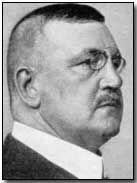Encyclopedia - Fatherland Party
 Formed towards the close of
1917 in clear and alarmed response to the high profile
Reichstag Peace Resolution debated in July that year, the German
Fatherland Party - Vaterlandspartei - represented a concerted effort
by right-wing militarists to ensure continued support for the government's
prosecution of the war.
Formed towards the close of
1917 in clear and alarmed response to the high profile
Reichstag Peace Resolution debated in July that year, the German
Fatherland Party - Vaterlandspartei - represented a concerted effort
by right-wing militarists to ensure continued support for the government's
prosecution of the war.
That the government was actually presided over by leading military figures, in the guise of the Third Supreme Command's Paul von Hindenburg and (more to the point) Erich Ludendorff, wholly suited many of the Fatherland Party's conservative (and usually militaristic) members.
Assisting in founding the party were figures including Wolfgang Kapp - later to gain notoriety via the failed Kapp Putsch - and former Naval Minister Alfred von Tirpitz (its post-war leader).
With the vigorous backing of the Fatherland Party - which boasted some 1.2 million members within a year - and its apparent newly-boosted legitimacy, Hindenburg and Ludendorff threw off all pretensions of the German war effort as a purely defensive struggle, and unveiled a sweeping series of annexationist policies intent upon greatly expanding Germany's post-war sphere of influence.
It was perhaps no coincidence that the party was chiefly funded by the Third Supreme Command. Allied with its resolutely pro-war stance the party came out therefore in firm opposition to any further hints of popular constitutional reform.
An Armlet was a cloth band worn around the arm to identify a particular duty or function.
- Did you know?
